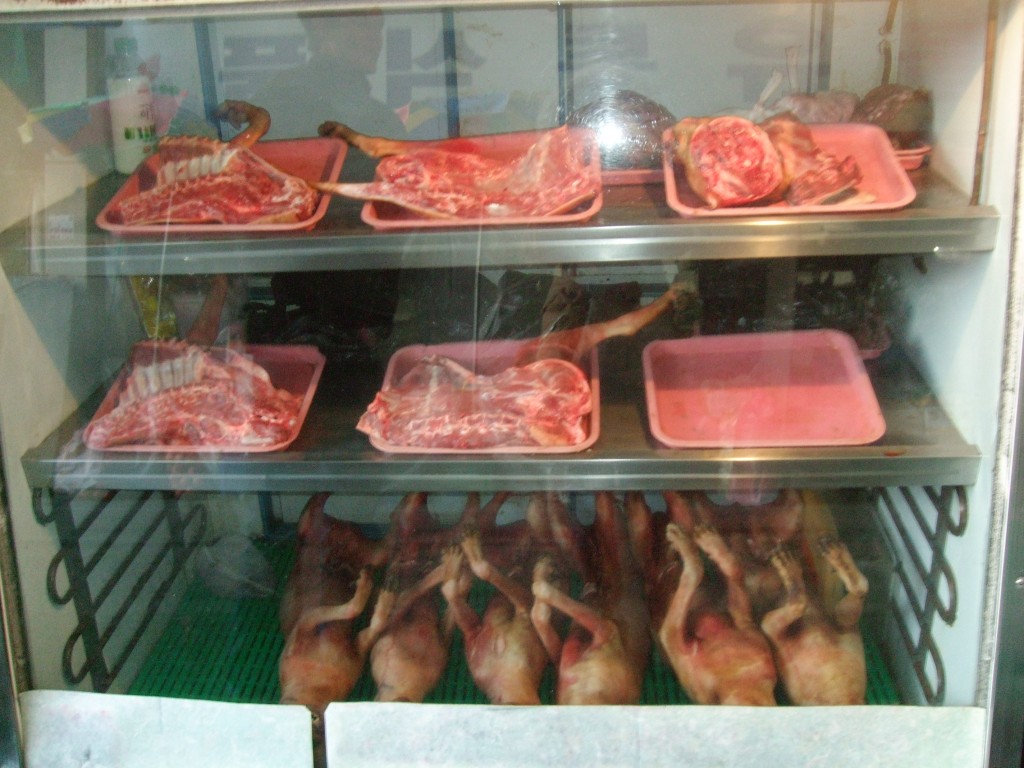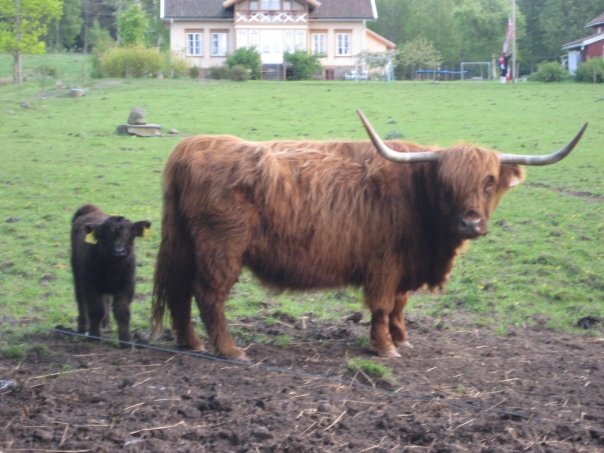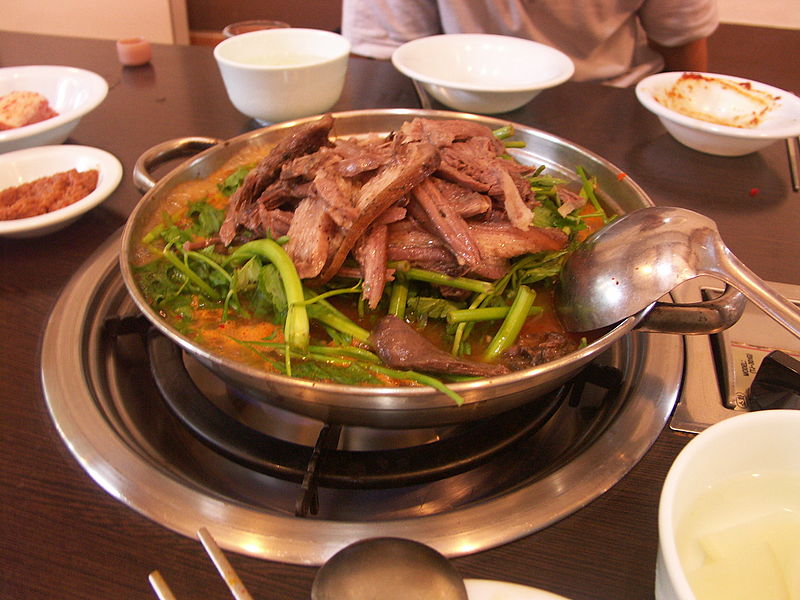One of my favorite things about travel is experiencing a culture far from my own. I love to learn about various customs, beliefs and traditions from around the world. I find it so fascinating because it enables me to examine and reflect on my own culture. And doing so forces me to question my own morals and beliefs. As was the case when I visited Korea and discovered their appetite for dogs. While initially, as you can imagine, I was quite disturbed, the more I learned and contemplated this tradition the more I became less opposed to the idea.
As I wandered the street market of Cheong Ju city in central Korea, the sights and smells of myriad strange vegetables, seafoods and meats overcame my senses. I was intrigued and excited at the opportunity to experience such an exotic market.
However, as I arrived at the far end of the market, my initial delight was quickly replaced by overwhelming distress. In a refrigerated display, next to a bucket of pigs heads, were 6 skinned animals lying on their backs. Out of curiosity, I stepped forward to examine them further. Immediately I could distinguish huge fangs and distinct paws. Confused and frightened by what was before me, I reflexively jumped back. Are those? Could they be? They were! O no, I thought to myself while hiding my surprise from the shopkeeper. How could you do it? How could you kill Lassie? I thought, as I stared helplessly at the display. While I had heard that Koreans ate dog, I never truly believed it until now.

Dogs at the street market
Though I pride myself on being fairly culturally tolerant, I was really quite disturbed. Of all the morally controversial things I have come across in my travels, few have been as shocking.
As an American, I grew up in a culture that had glorified the dog as mans best friend. Most of my friends had dogs growing up and loved them as if they were part of the family. No one would ever contemplate the idea of serving up scruffy for dinner in even the hardest of recessions. Yet for around 100 bucks, I could potentially purchase an entire dog and eat it for diner!

Stray dogs in Thailand
I had to learn more about this tradition. I needed to know why? So, I began by asking my Korean friend. She explained to me that eating dog is a tradition as old as Korea. That dog meat is considered one of the healthiest meats one can eat. It’s lean consistency makes it an ideal source of protein, improving body strength for both men and women. And it is good for male stamina, circulation and virility. More, she told me of how not every dog is eaten. In fact, there are only a few types of dog and they are bread specifically for human consumption.
As I learned and pondered more, I began to feel less averse to the idea of eating dog. It began to seem less cruel and I was able to respect the practice as a tradition unique to Korean culture. However, I wasn’t quite at the point of having dog stew for dinner.
Ultimately, it really depends on your cultural lens and subsequent moral perspective. Just as the Indian’s have glorified the cow, the Americans and the West have done so with the dog. While the devout Hindu would condemn us for the billions served at McDonalds, so too would American dog lovers condemn the Korean for their seemingly unorthodox appetite. However, aren’t they both just animals? Is there really much difference between a cow and a dog?

Hairy cows in Norway
Most of you would probably argue that yes, there is. Dogs are mans best friend and nearly next to kin. They display emotions and are extremely intelligent. While this was my initial argument too, is it completely true? Are dogs more human like and smarter than cows? In order to determine the answer to this, I decided to do some research.
To my surprise, regarding Cow/Dog intelligence, I discovered that some scientists actually believe the cow to be more intelligent on some levels than the dog. Their arguments include high problem solving capabilities and the ability to learn through the successes or failures of other cows. However, many scientists agree that due to innate anatomical traits, there is no objective way to make a comparison between the species. Regardless, it seems as though cows aren’t as dumb as I believed.
Regarding animal emotions, I discovered that the main reason why we see dogs as having a personality and being human like is because of our tendency to anthropomorphize them. We anthropomorphize them, or give them human traits, in an attempt to better comprehend them. To translate their behavior into something we can relate to. Thus, dogs, like cows, exhibit emotions that result from our own projections. So, if you look at it in this light, eating dog isn’t much different than eating cow.
While initially I believed that eating dog was cruel and bizarre, after learning about the tradition and reflecting on my own beliefs, I eventually started to think, “why not eat dogs?” Regardless of whether you agree with this practice or not, when you are traveling and come across what you believe to be a strange and unusual tradition, it is best to keep an open mind.
As the saying goes, or doesn’t go, one mans dog is another mans feast.











Dogs bond better and seek more attention from Humans. They are different than cows. And personally, I don’t think cows should be eaten either. Especially McDonald’s, that stuff is horrible for you..
We are all animals. And in some places they eat babies too, even 1 year olds..
Babies? Where do they eat babies?
Thats honestly surprising. I spent 1990~1999 in Korea, and some years in between then and now visiting, and I have never even seen dog meat before.
Most people I’ve talked to about it have reacted in very similar ways to Americans as well. Dogs are very common house pets in Korea too, after all. I’ve heard rumors as well, but I’ve never actually seen it in practice.
Anyways, this article is a pretty good insight as to the hypocritical nature of cherry picking animals for consumption. Cows and pigs are incredibly intelligent creatures, much more so than we give them credit for.
Really? I was under the impression it was pretty prevalent all around Korea. Thanks, I like to analyze/expose issues like this. Cheers, Leif
Well… When survival is your first instinct, then eating any kind of meat is not a big deal. Survival of the fittest.
But my question is, when we have evolved into a community that can understand animal emotions, differentiate between plant and animal life and found ways to live without eating animals by finding substitutes and yet remain healthy, who not choose to live like that? When we take stuff off the developed world like electronics etc, why not adopt the way to live with farming?
Vegetarian food is varied and if u cant believe it, please visit India :) It has an amazing array of Non-vegetarian food too.. but u’ll be surprised at the variety in vegetarian food :)
No, i am not urging anyone to stop eating meat. The decision can only be conscious that can come only from self realization.
I understand this article for the view it is providing and i agree with it. My comment is just an extension of it.
Cheers
Sravanthi
I hear ya Sravanthi, there is a lot of great vegetarian food in India. Sometimes I even thought it was beef. Thanks for your comment :)
i like the way you presented the idea of eating dogs and cows… i’ve tried eating dogs before but i didnt like it…
Do they eat dogs in the Philippines?
Leif, you bring up some great points in this article. I’ve actually lived in Korea for 3 years teaching English and I’ve tried Boshitang (Dog Meat Stew). In my opinion, culture trumps whatever criticism western views have over such a practice. There would be those in other parts of the world offended that cows or pigs are on the plate. As you mentioned this practice is traditional and considered by Koreans to offer many health benefits. I know of a few Korean friends who ate this after having surgery – thinking it would help them to regain their strength.
Thanks Samuel, I think next time I’m in Korea, I will eat dog too!
Living in carnivorous Spain, I feel like I’m often confronted with this same dilemma when it comes to bulls, sheep and pigs. After spending a day shepherding, I now can no longer eat lamb – they’re just too cute! And when I think about pigs, I realize that they are incredibly smart animals, so at this point in life I do everything I can to avoid them so as not to create any lamb-like conflicts of interest. If I didn’t love jamon so much, I’d for sure be a vegetarian.
haha, I hear ya.
Great points and you make a lot of sense! Definitely, we all have a cultural filter we see the world through, and as open minded as we try to be, certain things will shock us (but that doesn’t mean we’re insensitive). I liked that you did research and found an understanding of something that was strange to you. Did you happen to work up the nerve to try dog meat? :)
Hey, thanks! I never got the chance to eat it. I probably could have if I went looking for it. But if someone had set a dish of dog stew in front of me, I would have given it a go.
I grew up in Newfoundland, and we would eat seal all the time, which lots of folks also think is cruel. It all depends on your culture what the norm is. I don’t think I’d try dog, but cats are another story — we have distinct hatred for each other… :)
BUT,boiling them alive??Thats cruel,got to be evil and skinning them alive? any animal skinned and boiled alive,for that matter.any human also.
That picture there is a joke. They definitely don’t boil live puppies.